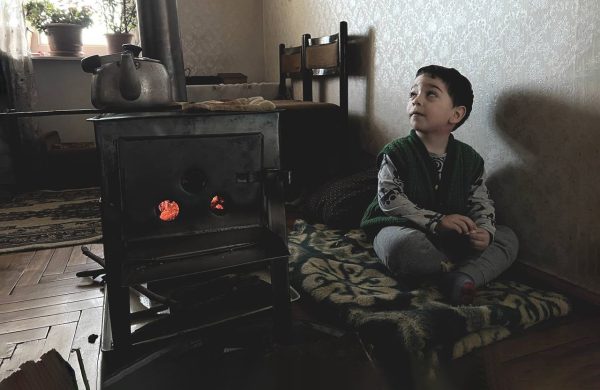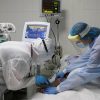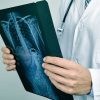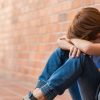Since December 12, 2022 the region of Artsakh, where 120,000 Armenians live, has been blockaded by Azerbaijan. With the help of the International Red Cross, humanitarian supplies were delivered to the region, including food and medicine. Since July 7, entry has been completely closed for those as well. There is a shortage of food in the region; there is no medicine, water, or fuel. The residents of Artsakh told Pravmir about the life under the blockade.
What Is Happening
The Lachin corridor, the only road linking Armenia and Artsakh, was blocked in December 2022 by Azerbaijani citizens who called themselves eco-activists. They stopped the protest at the end of April, after the installation of a checkpoint by the Azerbaijani side. On June 23, concrete barriers appeared on the Hakari Bridge, blocking any movement.
On August 1, in an interview with Euronews, Azerbaijani President Ilham Aliyev has insisted that the Lachin corridor was not blocked.
On August 11, 2023, Armenia asked the UN Security Council to convene an emergency meeting due to the blockade of the Lachin corridor.
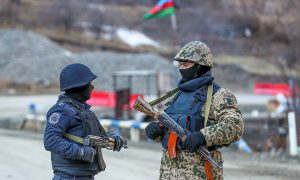
Photo by Aziz Karimov / Reuters
“After June 15, 2023, the extreme shortage of essential goods, including food, medicine, and fuel, worsened <…>. As a result, the people of Artsakh today are on the verge of a complete humanitarian disaster,” Mher Margaryan, the permanent representative of the Republic of Armenia to the UN, said in a letter.
“We go out for food, as if we’re hunting.”
Marina Kreemo, jewelry designer, Stepanakert
It’s been a month now since any humanitarian cargo has been allowed to enter. The heat outside is 40 degrees. And in the morning, you go out for groceries, as if you’re hunting. You never know where or at which end of the city you’ll be able to find something. People often faint while waiting in lines in this heat. Neither I nor my mother (she is 80 years old) have the health to stand in lines for a long time.
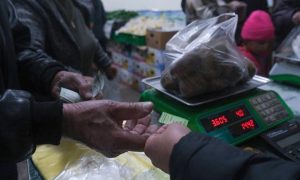
Photo: vk.com / free_artsakh
Vouchers for groceries and household chemicals were made available back in February. There were no fruits and vegetables during the winter and early spring.
Products can be obtained via barter. People are trading. Someone has a pack of coffee, another has a carton of milk. There are a lot of desperate posts from mothers with babies in bartering groups. They are looking for baby food and formula. And there is none. The children are crying from hunger. In clinics, baby food is sometimes given to mothers with children under 2 years old, but it is only enough for two days.
Entries from the product bartering group page (translated)
• Hello. Who can sell Heinz porridge? The price does not matter; the child does not eat anything
but that.
• I will exchange 1 kilogram of granulated sugar for baby soap. NOT SELLING.
• I will exchange liquid soap for butter.
• Trading potatoes for fuel.
• Dear humans, can someone, by any chance, give me a prompt where one can get toothpaste and sanitary pads.
• Candy or baby biscuits are needed. Swapping for vegetables from the garden or raspberries.
• Is there a chance I can get coffee, salt, or dishwashing liquid? Nothing for exchange, sorry.
• Children need exercise books for school (September is coming). Any chance someone has a stash?
My niece goes to kindergarten, but there is little food there—there was no bread at all for a long time; once they were given only three spoons of jam. I don’t know if kindergartens will continue to operate. Now there are no vouchers because there are no products. All stores are empty. There are no medicines in pharmacies either. None. There is no laundry detergent or soap. No sugar,salt, or oil. Now people bring produce from our villages; these are vegetables and fruits. They bring those on horses, bicycles, and in wheelbarrows. Gasoline and diesel are not available at all. City transportation has not been operating for a month. There are abandoned cars all over the city.
Mom takes heart medication. My niece was able to find a pack of the needed medication in a remote pharmacy. But in essence there are no basic medicines in the entire city. And how we will go on, I don’t know.
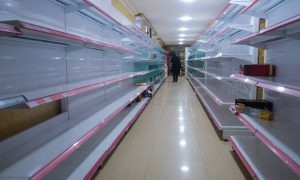
Photo: vk.com / free_artsakh
There is no gas. We cook on an electric stove. But we have rolling blackouts. There is a power outage schedule. Every 4 hours they disconnect the electricity for 2 hours. But it can be disconnected suddenly, at any moment. Refrigerators and electric stoves are breaking down because of this. There are homemade electric stoves on sale—a stone base and a coil—but they are dangerous; they explode. But even these are difficult to buy.
There was a period in winter, when there was no lighting at all on the street at night. You go out and you don’t see the neighbor’s house. Now at least the lanterns are lit in a checkerboard pattern.
But the people of Artsakh are very united. There have been no sweets in the region for a long time. Recently, my mother became ill while waiting in line. And the woman next to her gave her candy. It’s amazing. My mother has been a schoolteacher for 45 years. Many people in Stepanakert know her, so they let her through the queues and help her.
Three days ago the water was gone. In some houses that stand on the slopes of the mountains, there is still water on the ground floors. At the upper levels of the high-rise buildings, there is no water at all.
Water is brought there now. But this is torture; both the elderly and the children are dragging canisters of water. Now we need to get not only food but also water.
When Azerbaijan blocked the Lachin corridor, people began to stock up on food and fuel. But no one thought that the blockade would last such a long time that we would be on the verge of a humanitarian disaster.
We saw it all in the 90s. The military, the hungry 90s. My family has seen famine. Back then, the entire family ate nothing but millet. Now I’m not so hungry. But now it’s not easier; it’s harder for us. Then we were strong in spirit; now they want to break our spirit.
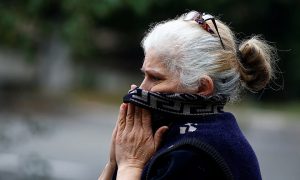
Photo: Stringer / Reuters
We lost the war; there were so many victims. And we have no control over our fate. The most hurtful thing is that no one knows about us, and no one wants to know. We are a small nation that no one really needs.
I am not afraid of hunger. The most important thing that worries us is safety. We are in a trap, completely surrounded, preparing to survive the winter in a blockade. It’s so terrifying that the world is silent about us.
Medicine: the situation is critical
The supply of medicines in Artsakh was reported to be critical by the Armenian Minister of Health Anahit Avanesyan in mid-July.
“The medicinal resources of Artsakh are certainly not endless. This situation is a serious health crisis because, at the moment, the whole process has been disrupted; new batches of medicines are not being received in Artsakh,” the minister said.
All of the planned medical interventions have been suspended in Artsakh; medicines and medical supplies are used only in cases of urgent need and emergencies.
She also noted that there are patients who need to be transported to Armenia.
On August 12, 10 patients, along with their companions, were transported to specialized medical centers in Armenia, accompanied by the International Committee of the Red Cross.
“I don’t know how long we will last without medicines.”
Mher Musayelyan, Head Physician of the Republican Medical Center, Stepanakert
On July 7, the road for humanitarian supplies was completely closed, and medicines no longer arrive here. The situation now is the most severe since the beginning of the blockade.
In the hospital and outpatient clinic, the supply of medicines is almost exhausted. We have only 20% of the stock that should be in the hospital. Before the blockade, in our outpatient clinic and in the polyclinic service, people with disabilities and people over 70 received medicines under the state program. These are people with diabetes, epilepsy, and other chronic diseases. During this month, many medicines for these categories of patients have been exhausted. In the children’s hospital, the situation is just as severe.
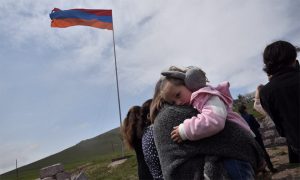
Like all shops, pharmacies in Artsakh are empty. With the help of the Red Cross, we managed to bring medicines for some cancer patients before July 7th. This reserve is practically depleted. There are patients who need radiation therapy. It is not administered in Artsakh, we always directed them to Yerevan. Here, we cannot treat oncology of the brain or liver. All these patients remain untreated. There are many patients who need to be transported for further examination and treatment in Yerevan.
We have now managed to agree with the Red Cross on sending only the patients undergoing hemodialysis therapy to Yerevan.
There are virtually no consumables left here, which are the essential components for hemodialysis.
We determined that if we manage to send most of these patients, we will be able to stretch our medical supply for a longer period.
During a power outage, the hospital runs on a generator. We obtain fuel. Ambulances are still able to respond to emergency calls. Emergency patients are brought in by ambulances, but most patients arrive on foot. All medical staff — doctors, nurses, orderlies walk to work. I walk to the hospital every morning for about 40 minutes.
Now there is a large increase in the number of patients with a hypertensive crisis—an increase in blood pressure. This is due to the fact that patients are unable to regularly take medication. They are not available in pharmacies. The number of patients with anemia has increased. This disease must be regulated not only by iron supplements but also by nutrition. And problems with it are reflected in patients with reduced hemoglobin.
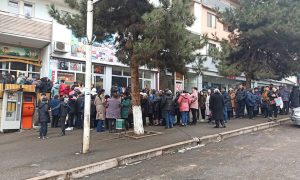
Photo: vk.com / free_artsakh
All our people stand in queues early in the morning without breakfast, there is no sugar now. In the queues, people with diabetes faint, sugar decreases. We often deal with such cases.
According to my data, stillbirth, intrauterine infant mortality has increased over the past month. There is an increase in anemia in pregnant women. They are undernourished. Patients with chronic cardiovascular disease should take anticoagulants, plain aspirin, and other drugs that thin the blood. Therefore, the number of heart attacks increased by 30%.
I leave the house early and return late. I need to stay in the hospital as long as possible to solve the emerging problems. In an emergency, if something happens, I won’t be able to come. Therefore, my wife and children are busy looking for food. The biggest burden now for me is the hospital, which I have to provide with the bare minimum.
The situation with bread a few days ago was critical; we couldn’t find bread. More or less possible today. Many probably see dairy products in their dreams— there is none.
I don’t know how much longer we will be able to go like this if there is no delivery of medicines. If the total blockade continues through the fall and winter, we will be in a catastrophic situation. The body is designed in such a way that in the summer you need to eat well, gain immunity in order to withstand the winter. I am sure that our people will not have any immunity this winter because one needs to eat well in order to have it. Every day we hope that the next day will be better and the road will open, but we are preparing for a harsh winter.
“We are in a mousetrap, the city is doomed to starvation”
Nune Arakelyan, university lecturer, Stepanakert
Every morning, rain or shine, I walk 40 minutes to the university. Our roads are mountainous, it’s either up or down. Now in August we are forced to start classes, because there will be no heating in winter. Classes were not canceled at the university in the winter; we sat in coats, hats, raincoats, jackets, wrapped in scarves. The temperature in my apartment dropped to +3 – +5. It’s alright.
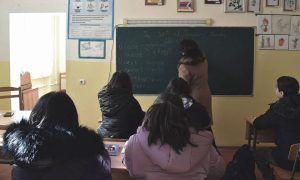
Photo: Security and development front of Artsakh
The students now are studying diligently. So it was in the 90s, when I was a very young teacher. The worse the situation, the better they studied. The greater was the interest towards learning. Maybe they have nothing better to do. The problem is that there is no transportation. Many students came from the villages every morning. So I don’t know how this will all turn out.
We do not have small children in our house, therefore I have stocks of rice, buckwheat, and pasta. Those with three or four children have no stocks at all. As a survivor of the hungry war years of the 90s, I always had the habit of buying everything in large batches. I’m used to having a supply of cereals, butter, and jam at home to last 2-3 months. When the road was closed, people thought they would open it in an hour. I told my son, “Let’s go through the supermarkets.” He laughed, “Leave your Soviet habits.” I say, “Let’s go, listen to mom!” We bought cereals, and now this saves not just us, but I also give some to my friends and relatives.
We opened a shelter for stray dogs just a month before the blockade. We had 27 dogs, now there are more than 50.
People can’t feed the dogs and get rid of them. They bring them to the shelter or just kick them out on the street. This is a disaster. There is no food.
Therefore, we go to local shops and buy meat leftovers. While there were cereals and pasta in the city, we made porridge for the dogs. Now there is no pasta since there is no flour, and there are no cereals either. If we manage to find something edible for our shelter, we believe that we have wrested it from fate. Our dogs are holding on, we began to feed them not three times a day, but once. They have lost a lot of weight, but they are alive.
I have a cat at home, I don’t know what to feed her. The food is all gone. Meat is incredibly expensive. People laugh, “You are all about your animals again. You should think about people!” But while caring for animals, we try not to lose our humanity. We need this so that we do not lose our human essence.
It is impossible to buy uniforms, notebooks, bookbags, and pens for schoolchildren. I tried to stand in lines a couple of times, it made me feel sick. So if I cannot buy bread without a queue, we are left without bread. We ate our entire supply of flour during these eight months; we ate all our chickens. We ate everything we had of our own in Artsakh.
If the blockade is not lifted, the city is doomed to a terrible famine. There are 60 thousand people in the city. A few days ago, they began to give water only at night. Now we shower and do the laundry only at nighttime.
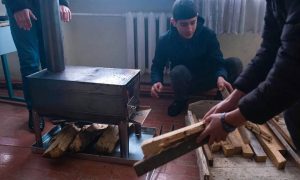
Photo: vk.com / free_artsakh
Recently, I heard a conversation on the street between three boys of ages 13–14 years: “We will survive, but what will happen to the children if the situation does not change and there is a real famine?” I could not resist, caught up, and asked, “Are you not children?” “No,” answered the smallest of the boys, “we have not been children for a long time. We’ve already grown up.”
There were many cases of people dying in the villages because there was no gasoline to take them to the city hospital. In the city, in extreme cases, you can somehow walk to the hospital. Pregnant women have had a lot of miscarriages because they weren’t able to get to the hospital.
The blockade is not only a lack of food. Everyone asks me what are we eating. This question really annoys me!
The food is not our main concern. The most terrifying thing is the uncertainty; the lack of freedom, the inability to see our relatives.
You are afraid when someone gets sick because there is no medicine. It is virtually impossible to transport a sick person out of here. People in bartering groups write and beg — we need painkillers, antibiotics— there is none. We feel like we are in a jar, in a mousetrap. And it slammed shut.
“There is no war, but this is a concentration camp for civilians”
Tatyana Hovhannisyan, doctor/ volunteer, Yerevan
Our fund is engaged in the education and training of doctors. Now we are in constant communication with doctors in Artsakh. Previously, we were able to transfer medication with the Red Cross for emergency operations. Now we are unable to deliver anything to Artsakh.
We purchased medication for them to last for six months. It’s all gone now. I don’t know what to do. If they don’t take the appropriate medications, the patients will die. And this is not just one disease. This is a wide range of diseases for both children and adults. Autoimmune, oncological.
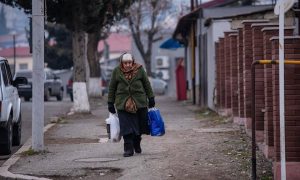
Photo by David Kagramanyan / ArmNews
All hemodialysis solutions have run out. There is no normal conservative therapy for patients with chronic diseases. Patients with diabetes cannot control their sugar. There are no basic medications.
Infectious diseases begin to spread because there are no antibiotics or antivirals. In terms of diagnostics, it is also a disaster because there are no diagnostic tests.
Children’s diseases, of course, are progressing. We have children with diabetes and juvenile rheumatoid arthritis in our care. In the case of arthritis, if the child does not receive an injection once a week, then they develop a complete disability, a severe pain syndrome. They currently don’t have the necessary medicines.
Horrifying situation with babies—no baby food, no infant formula. Until July 7, we sent baby food and formula with the humanitarian cargo, but that is also over now. There are outbreaks of leishmaniasis. Because there is no way to control the carriers. The veterinary service is in absolute collapse; there are no vaccines to vaccinate animals.
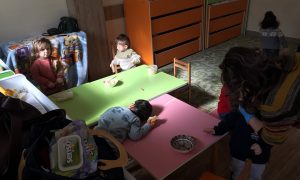
Photo: vk.com / free_artsakh
We are currently only able to provide consultations online. This is how we conducted a consultation with a child with newly diagnosed Mediterranean fever. We couldn’t imagine that this could happen in the modern world. When there is a war, the civilian population is evacuated. There are humanitarian corridors. There is no war here, but a kind of concentration camp has been created for civilians. The civilian population cannot be held hostage, especially children. But now there are 120,000 hostages, and 30,000 of them are children. From the point of view of human morality, I have no answers on how this can even happen. And no one writes about this, and politicians are silent. Why?












